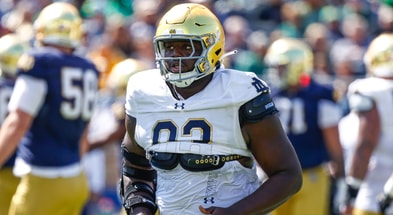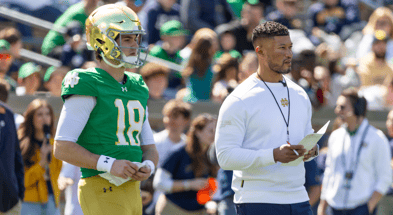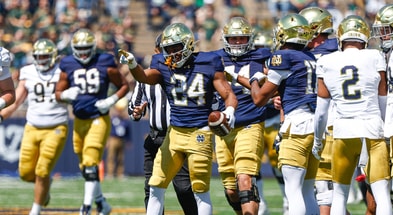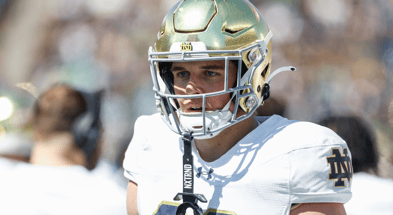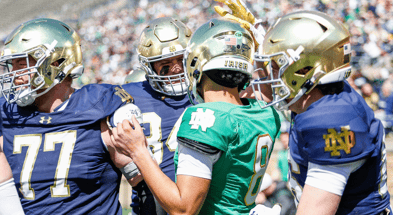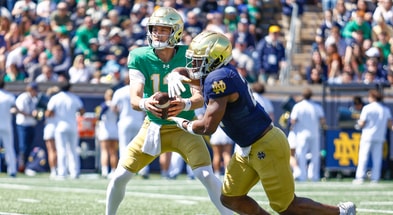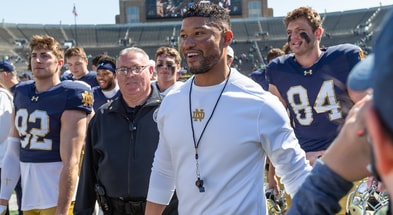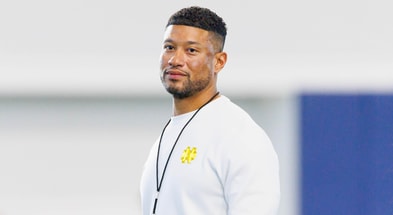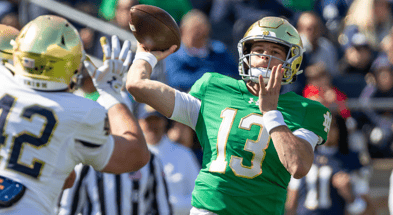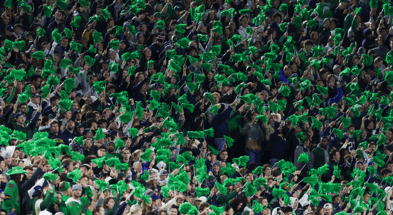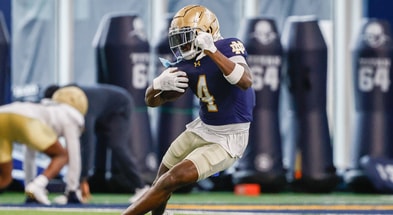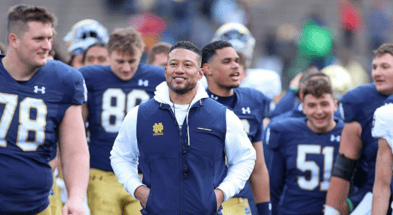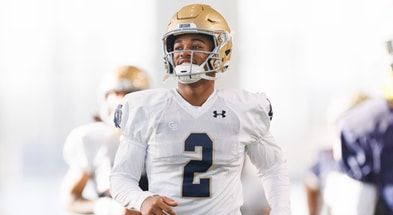Marcus Freeman: Notre Dame plans to keep Gerad Parker as offensive coordinator in 2024

The Gerad Parker era will go on in South Bend. After an up-and-down 2023 season, his first as Notre Dame’s offensive coordinator, Parker will retain the position in 2024. Head coach Marcus Freeman confirmed the plan to stick with Parker for a second season as his OC in a press conference Monday.
This isn’t just a Parker thing, either. Freeman feels it’s best to avoid coaching staff turnover of any kind. Overall, he likes what everyone accomplished in Notre Dame’s 9-3 season from a coaching perspective.
“If it’s up to me, as I just told the coaching staff and our staff, I have a strong belief in the coaches that we have in this football program and would love all of them to be back,” Freeman said.
Parker was promoted to offensive coordinator in February after former Notre Dame OC Tommy Rees left for the same job at Alabama. The Irish courted Kansas State’s Collin Klein and Utah’s Andy Ludwig, bringing them both to campus for interviews, but they reportedly both turned down offers. Freeman landed on Parker, who he hired as Notre Dame’s tight ends coach in 2022 and worked with at Purdue from 2013-16, as a third option.
The Notre Dame offense started the season on a torrid pace, scoring 40-plus points in each of the first four games. The Irish averaged 508.8 total yards per game against Navy, Tennessee State, NC State and Central Michigan. Then things took a serious downturn when the competition got stiffer.
In Notre Dame’s next four games against Ohio State, Duke, Louisville and USC, the Irish posted a 2-2 record and averaged 320.3 total yards per game. The level of graduate student quarterback Sam Hartman‘s play dipped dramatically. He threw 13 touchdown passes and 0 interceptions in the first four games and 5 and 3, respectively, in the next four.
“The biggest thing, as I told Coach Parker and his staff, is we have to improve our performance — especially in those big games against good defenses,” Freeman said. “Those are the types of teams we have to find a way to beat if we want to be a championship program.”
Top 10
- 1New
Finebaum on Nico
'I would stay away'
- 2
Field of 64 projection
Predicting NCAA Baseball Tourney Field
- 3
Harrison Bailey
Reacts to Nico Iamaleava
- 4Hot
Jaydn Ott
Top RB enters transfer portal
- 5Trending
Angel Reese
Reacts to Hailey Van Lith
Get the On3 Top 10 to your inbox every morning
By clicking "Subscribe to Newsletter", I agree to On3's Privacy Notice, Terms, and use of my personal information described therein.
Hartman did not have any touchdown passes to go along with 2 INTs in a 31-23 loss to Clemson on Nov. 4. He only attempted two play-action passes that afternoon according to Pro Football Focus, much to the dismay of Notre Dame football observers everywhere. The play-action conundrum was a bugaboo for Parker for much of the year. He was constantly questioned for not calling it as much as outsiders thought he should.
Per PFF, Hartman was 41-of-69 (59.4 percent) for 743 yards with 9 touchdowns and 2 interceptions on play-action passes during the 2023 regular season. For reference, Sports Info Solutions has Hartman down for 67 play-action passes. That ranks 98th nationally per SIS. Georgia Southern’s Davis Brin leads the FBS with 190. For more context, Heisman Trophy hopeful Box Nix of Oregon attempted 155 play-action passes per SIS.
Perhaps hearing the noise and feeling the heat, Parker dialed up 12 play-action opportunities for Hartman in a 45-7 Irish win over Wake Forest and seven against Stanford. Hartman went 15-of-19 (78.9 percent) for 248 yards with 4 touchdowns and 0 interceptions on play action in those two games.
Despite a lack of season-long play action, Notre Dame finished the regular season ninth nationally in scoring offense at 39.1 points per game. The Irish also ranked ninth nationally in yards per play at 6.95. Those numbers were likely enough to warrant Freeman believing Parker can run it back next year and have a successful second season as the program’s offensive coordinator.
“Our entire offensive staff and Coach Parker have done a good job of continuously trying to find ways to improve,” Freeman said. “Sometimes it takes setbacks to figure out what we need to do to improve moving forward.”

